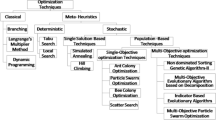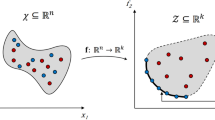Abstract
Multi-objective optimization is one of the most important aspects of operational research, and has been applied widely. Most of the existing research works on multi-objective optimization focused on the concrete solutions to detailed optimization problem in reality, lacking of the deep investigation on the fundamental thinking and methodology of the multi-objective optimization problem. To fill this gap, this paper studies the multi-objective optimization problem from a Chinese traditional philosophic angle. Based on the theories and ideology of I Ching, we investigate the basic thinking and methodology of multi-objective optimization, and summarize three methodological patterns for modeling and solving the problems, which are local optimization for global moderation, divide and conquer after comprehensive consideration, and combination of division and integration. Basic ideas, approaches and examples for such three patterns are introduced, and the relationships among the three patterns are discussed from both philosophic and mathematical aspects. Furthermore, for the computational solutions of multi-objective optimization problems, we summarize four thinking patterns based on traditional Chinese philosophy, which are changing thinking, fuzzy thinking, uncertainty thinking, and imaginable thinking. Algorithms that are inspired by the four thinking patterns are presented. This work seeks to study the fundamental thinking and methodology of multi-objective optimization problem from a combination angle of science and philosophy, which is expected to inspire new ideas and methods for solving the problem.


Similar content being viewed by others
References
Lin C, Li Y, Wan J (2011) Optimization approaches for QoS in computer networks: a survey. Chin J Comput 34(1):1–14 (in Chinese)
Dridi O, Krichen S, Guitouni A (2012) A multi-objective optimization approach for resource assignment and task scheduling problem: application to maritime domain awareness. In: 2012 IEEE congress on evolutionary computation (CEC 2012), Brisbane, QLD, Australia (article no. 6256501)
Lin C, Chen Y, Huang J, Xiang X. A Survey on models and solutions of multi-objective optimization for QoS in services computing. Chin J Comput 38(10):1907–1923 (in Chinese)
Qi L, Tang Y, Dou W, Chen J (2010) Combining local optimization and enumeration for QoS-aware web service composition. In: Proceedings of the 8th IEEE international conference web services, pp 34–41
Alrifai M, Skoutas D, Risse T (2010) Selecting skyline services for QoS-based web service composition. In: Proceedings of the 19th international conference on World Wide Web, pp 11–20
Zeng L, Benatallah B, Ngu AHH, Dumas M, Kalagnanam J, Chang H (2004) QoS-aware middleware for web services composition. IEEE Trans Softw Eng 30(5):311–327
Yu W, Guo C (2016) Construction and implementation of assessment and management system of hydropower scheduling based on water level control coefficient. Water Power 42(4):90–92 (in Chinese)
Peterson LL, Davie BS (2007) Computer networks: a systems approach. Elsevier, Amsterdam
Huang J, Chen Y, Lin C, Chen J (2014) Ranking web services with limited and noisy information. In: 2014 IEEE International conference on web services (ICWS 2014), pp 638–645
Wang Q, Su M, Yu W (2016) Research on evaluation method of wind power curve based on 17999 curve. Power Gener Air Cond 37(2):9–12 (in Chinese)
Huang J, Lin C (2013) Improving energy efficiency in web services: an agent-based approach for service selection and dynamic speed scaling. Int J Web Serv Res 10(1):29–52
Huang J, Lin C, Wan J (2013) Modeling, analysis and optimization of dependability-aware energy efficiency in Services computing systems. In: Proceedings of the IEEE International conference on services computing (SCC 2013), Santa Clara, CA, USA, pp 683–690
Haimes YY, Ladson LS, Wismer DA (1971) Bicriterion formulation of problems of integrated system identification and system optimization. IEEE Trans Syst Man Cybern 3:296
Tordsson J, Montero R, Moreno-Vozmediano R, Llorente Ignacio M (2012) Cloud brokering mechanisms for optimized placement of virtual machines across multiple providers. Future Gener Comput Syst 28(2):358–367
Breitgand D, Marashini A, Tordsson J (2011) Policy-driven service placement optimization in federated clouds. IBM Research Division, Technical report, New York
Chen Y, Huang J, Xiang X, Lin C (2014) Energy efficient dynamic service selection for large-scale web service system. In: Proceedings of 21st IEEE international conference on web services (ICWS 2014). Alaska, USA, pp 558–565
Chen Y, Huang J, Lin C, Hu J (2015) A partial selection methodology for efficient QoS-aware service composition. IEEE Trans Serv Comput 8(3):384–397
Vira C, Haimes YY (1983) Multiobjective decision making: theory and methodology. North-Holland, New York
Steuer RE (1989) Multiple criteria optimization: theory, computation, and application. Krieger, Malabar
Bessai K, Youcef S, Oulamara A, Godart C, Nurcan S (2012) Bi-criteria workflow tasks allocation and scheduling in cloud computing environments. In: Proceedings of 2012 IEEE 5th international conference on cloud computing (CLOUD 2012). Honolulu, USA, pp 638–645
Deb K, Pratap A, Agarwal S, Meyarivan T (2002) A fast and elitist multiobjective genetic algorithm: NSGA-II. IEEE Trans Evol Comput 6(2):182–197
Zitzler E, Laumanns M, Thiele L (2001) SPEA2: improving the strength pareto evolutionary algorithm for multiobjective optimization. In: Proceedings of evolutionary and deterministic methods for design, optimization and control with applications to industrial and societal problems conference (EUROGEN 2001), Athens, Greece, pp 95–100
Ma H, Bastani F, Yen I-Ling, Mei H (2013) QoS-driven service composition with reconfigurable services. IEEE Trans Serv Comput 6(2):20–34
Zhang Q, Li H (2017) MOEA/D: a multiobjective evolutionary algorithm based on decomposition. IEEE Trans Evol Comput 11(6):712–731
Ripon K, Glette K, Høvin M, Torresen J (2010) A genetic algorithm to find pareto-optimal solutions for the dynamic facility layout problem with multiple objectives. In: International conference on neural information processing (ICONIP 2010), pp 642–651
Lin C, Wan J, Xiang X, Meng K, Wang Y (2012) Dynamic optimization in computer systems and computer networks: models, solutions, and applications. Chin J Comput 35(7):1339–1357 (in Chinese)
Chen Y, Lin C, Huang J, Xiang X, Shen X (2017) Energy efficient scheduling and management for large-scale services computing systems. IEEE Trans Serv Comput 10(2):217–230
Zhou Z, Liu F, Jin H, Li B, Li B, Jiang H (2013) On arbitrating the power-performance tradeoff in SaaS clouds. In: Proceedings of IEEE INFOCOM 2013, Turin, Italy, pp 872–880
Zhou Z, Liu F, Xu Y, Zou R, Xu H, Lui John CS, Jin H (2013) Carbon-aware load balancing for geo-distributed Cloud services. In: Proceedings of 2013 IEEE 21st international symposium on modeling, analysis and simulation of computer and telecommunication systems (MASCOTS 2013), San Francisco, CA, USA, pp 232–241
Ren S, He Y, Xu F (2012) Provably-efficient job scheduling for energy and fairness in geographically distributed data centers. In: Proceedings of IEEE international conference on distributed computing systems, Macau, China, pp 22–31
Chen Y, Lin C, Huang J, Shen X (2016) Cost-effective request scheduling for greening cloud data centers. In: 2016 IEEE international conference on services computing (SCC 2016), San Francisco, CA, USA, pp 50–57
Ho Y-C, Zhao Q-C, Jia Q-S (2008) Ordinal optimization: soft optimization for hard problems. Springer, Berlin
Zhao Q, Ho Y-C, Jia Q-S (2005) Vector ordinal optimization. J Optim Theory Appl 125(2):259–274
Lau TE, Ho Y-C (1997) Universal alignment probabilities and subset selection for ordinal optimization. J Optim Theory Appl 93(3):455–489
Wagner F, Klein A, Klöpper B, Ishikawa F, Honiden S (2012) Multi-objective service composition with time- and input-dependent QoS. In: 2012 IEEE 19th international conference on web services, Honolulu, HI, USA, pp 234–241
Chen W, Qiao X, Wei J, Huang T (2012) A profit-aware virtual machine deployment optimization framework for Cloud platform providers. In: 2012 IEEE fifth international conference on cloud computing, Honolulu, HI, USA, pp 17–24
Yusoh ZIM, Tang M (2012) Composite SaaS placement and resource optimization in cloud computing using evolutionary algorithms. In: 2012 IEEE fifth international conference on cloud computing, Honolulu, HI, USA, pp 590–597
Van Hasselt H, Guez A, Silver D (2016) Deep reinforcement learning with double Q-learning. In: 30th AAAI conference on artificial intelligence (AAAI 2016), Phoenix, AZ, USA, pp 2094–2100
Li S, Huang J (2017) Energy efficient resource management and task scheduling for IoT services in edge computing paradigm. In: IEEE international symposium on parallel and distributed processing with applications (ISPA 2017), Guangzhou, China, pp 846–851
Acknowledgements
This work is supported by the National Natural Science Foundation of China (Grant nos. 61472199, 61502043, 61772345 and 61402294), the Major Fundamental Research Project in the Science and Technology Plan of Shenzhen (Grant nos. JCYJ20160310095523765 and JCYJ20160307111232895).
Author information
Authors and Affiliations
Corresponding author
Additional information
Publisher’s Note
Springer Nature remains neutral with regard to jurisdictional claims in published maps and institutional affiliations.
Rights and permissions
About this article
Cite this article
Lin, C., Huang, J., Chen, Y. et al. Thinking and methodology of multi-objective optimization. Int. J. Mach. Learn. & Cyber. 9, 2117–2127 (2018). https://doi.org/10.1007/s13042-018-0866-x
Received:
Accepted:
Published:
Issue Date:
DOI: https://doi.org/10.1007/s13042-018-0866-x




